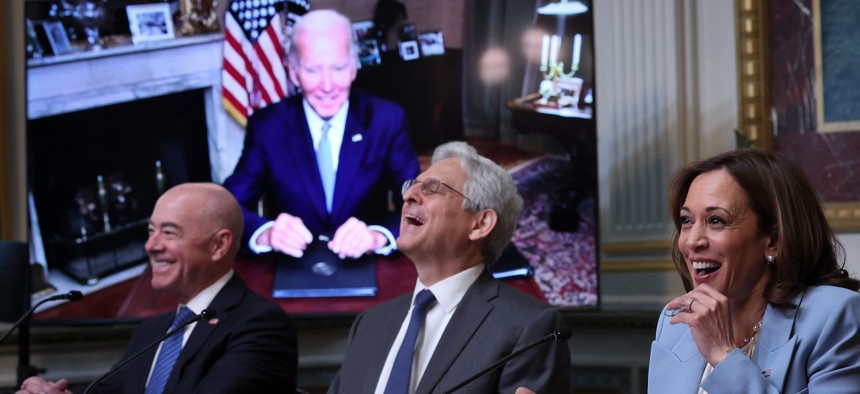
President Biden appears via teleconference at a meeting on Aug. 3. Biden is still testing positive for COVID-19 but is feeling well. Win McNamee/Getty Images
Coronavirus Roundup: HHS is Establishing a New Office Focused on Long COVID
There's a lot to keep track of. Here’s this week’s list of news updates and stories you may have missed.
As of Friday, President Biden is still testing positive for COVID-19 after getting reinfected last weekend, but he “continues to feel very well,” said his doctor in a letter. “His cough has almost completely resolved. His temperature, pulse, blood pressure, respiratory rate and oxygen saturation remain entirely normal. His lungs remain clear.” White House Press Secretary Karine Jean-Pierre reiterated during the briefing on Thursday that the president will stay in isolation until he tests negative and continue to work from the White House residence. Here are some of the other recent headlines you might have missed.
On Wednesday, the Health and Human Services Department released a National Research Action Plan on Long COVID and Services and Supports for Longer-Term Impacts of COVID-19 Report, in response to a directive from the president in the spring. HHS Assistant Secretary for Health Adm. Rachel Levine has been serving as the long COVID coordinator.
Now HHS is establishing a new Office of Long COVID Research and Practice in order to carry out the action plan and “ensure standardization and accountability,” said the plan, which also noted the new office “will need resources and staffing.”
Last week, HHS, in collaboration with the Defense Department, announced an agreement to buy 66 million doses of Moderna’s bivalent COVID booster for use in the fall and winter, pending authorization from the Food and Drug Administration and recommendation from the Centers for Disease Control and Prevention, to target the COVID subvariants. This is “in addition to the 105 million bivalent COVID-19 vaccine booster doses the U.S. government purchased recently from Pfizer for potential use later this year,” pending the greenlight from FDA and CDC, HHS said in a statement. In order to provide Americans with the latest, most effective vaccines, “in the absence of additional COVID-19 funding from Congress, earlier this month, the administration was forced to pull $10 billion from critical COVID-19 response efforts in order to pay for additional vaccines and treatments.”
The Special Inspector General for Pandemic Recovery repeated his call for an extension beyond the office’s five year sunset in his office’s quarterly report released this week. “We need this time to see our investigations through to completion,” said Special IG Brian Miller. “Most loans within our jurisdiction mature in 2025, and should defaults then occur, without an extension we will have sunsetted just when we are most needed.”
The Labor Department inspector general alerted the Employment and Training Administration that it needs to obtain “missing reports and correct information” from state workforce agencies for CARES Act unemployment insurance programs, despite the fact that the due date for these reports has passed. “Complete and accurate state data for CARES Act [unemployment insurance] programs is necessary for the department to assess CARES Act [unemployment insurance] activities and to mitigate the risk of overpayments, including fraud” as well as “identify program weaknesses and establish lessons learned that may be leveraged to improve states’ performance under future temporary programs,” wrote Carolyn Hantz, assistant IG for audit. “Furthermore, [the Employment and Training Administration’s] unsuccessful efforts to obtain the missing information that was critical to its [fiscal] 2021 financial statement audit could have a negative impact on the opinion the department receives for [fiscal] 2022.”
Brent Parton, acting assistant secretary for employment and training at the Labor Department, said the Employment and Training Administration agrees with the IG about the importance of the issues raised in the report and concurred with its recommendations, but “wishes to note the numerous errors in the report––specifically regarding some of the states erroneously identified in the report.”
Help us understand the situation better. Are you a federal employee, contractor or military member with information, concerns, etc. about how your agency is handling the coronavirus? Email us at newstips@govexec.com.







